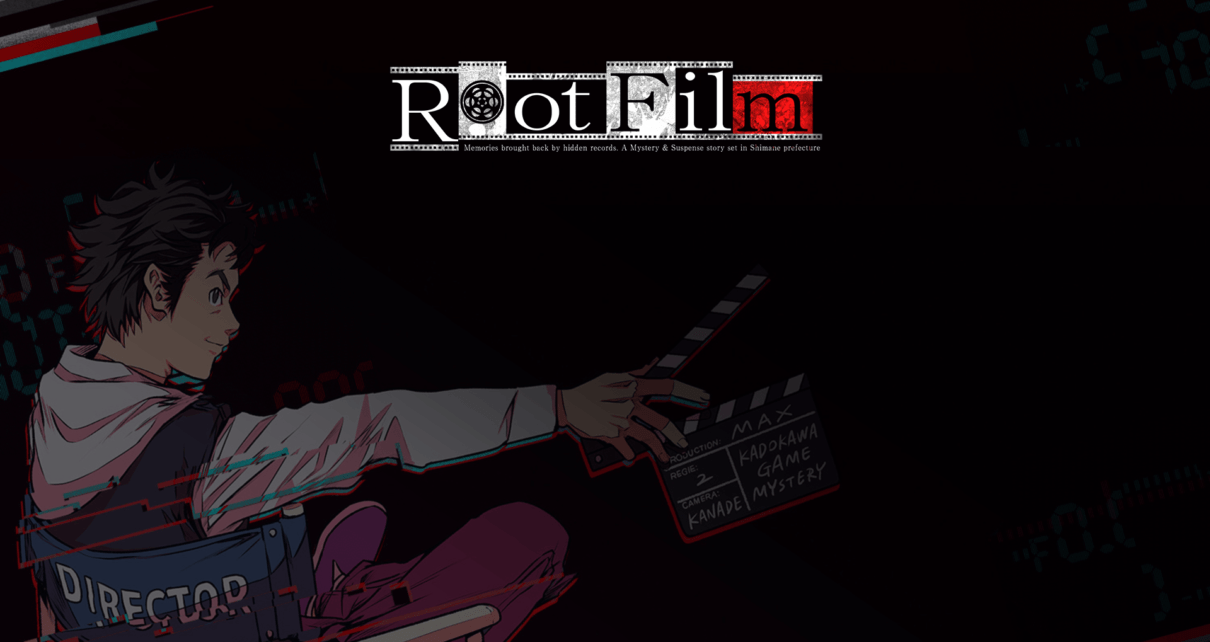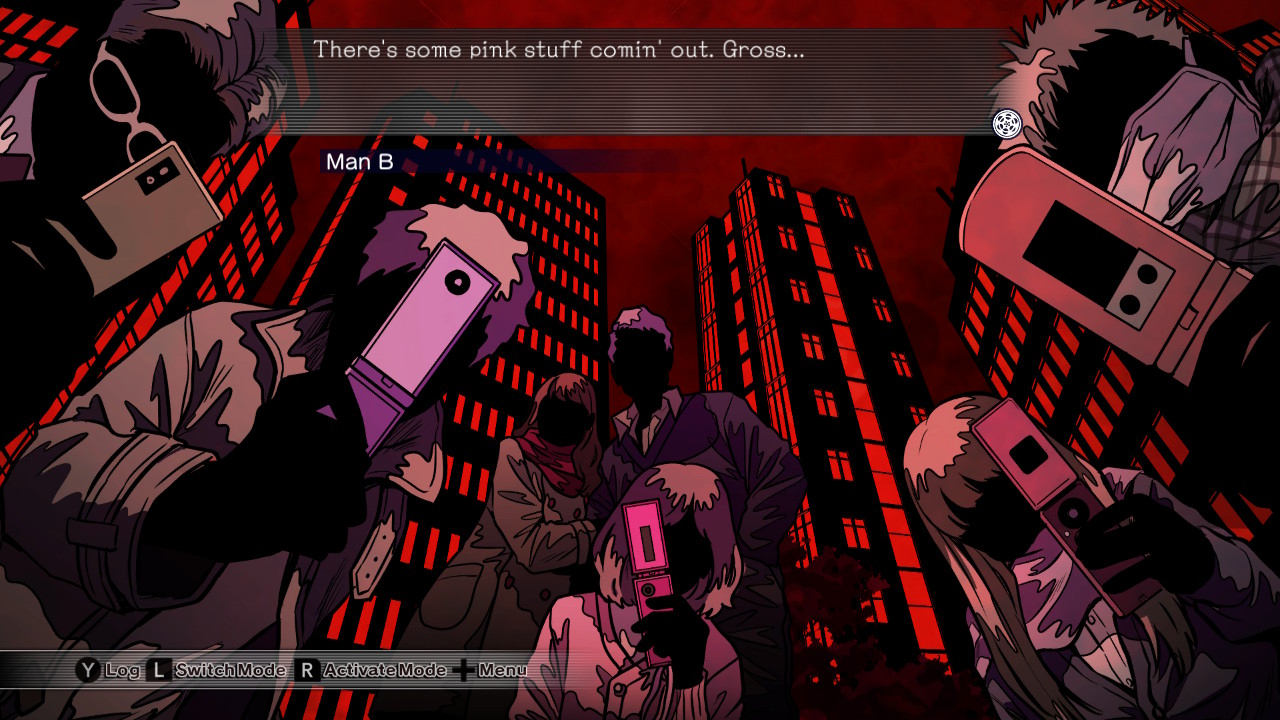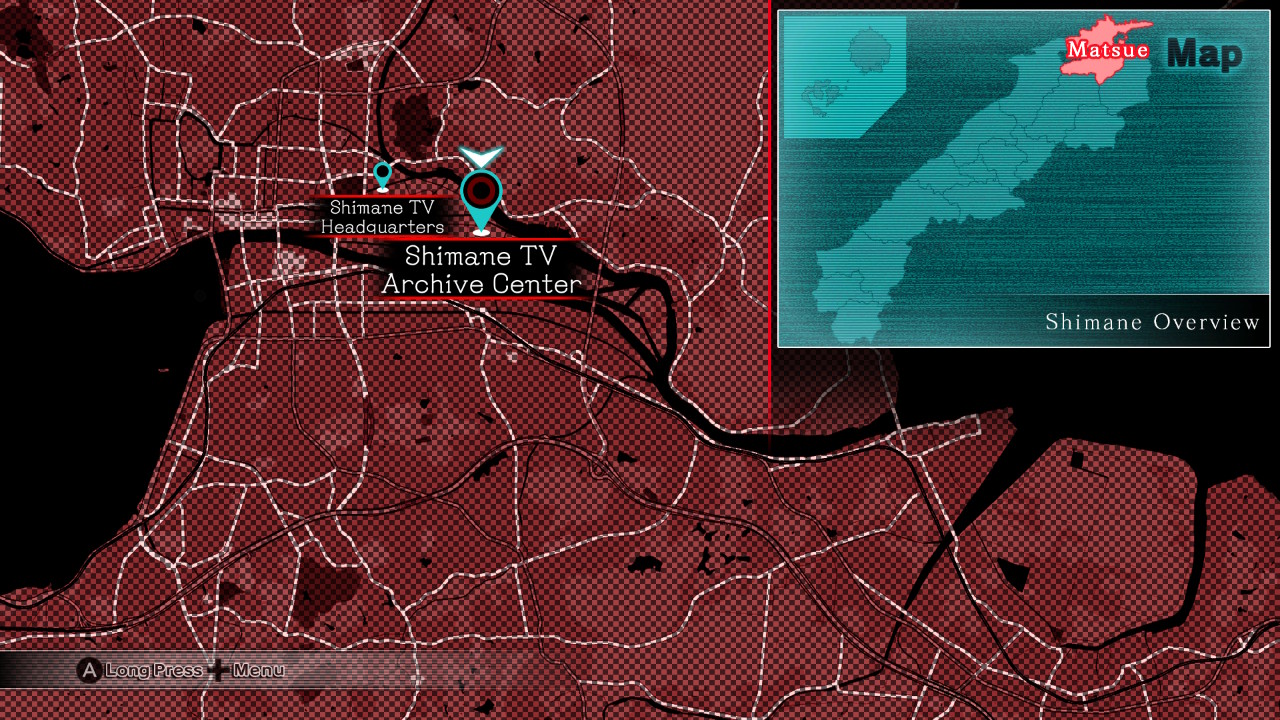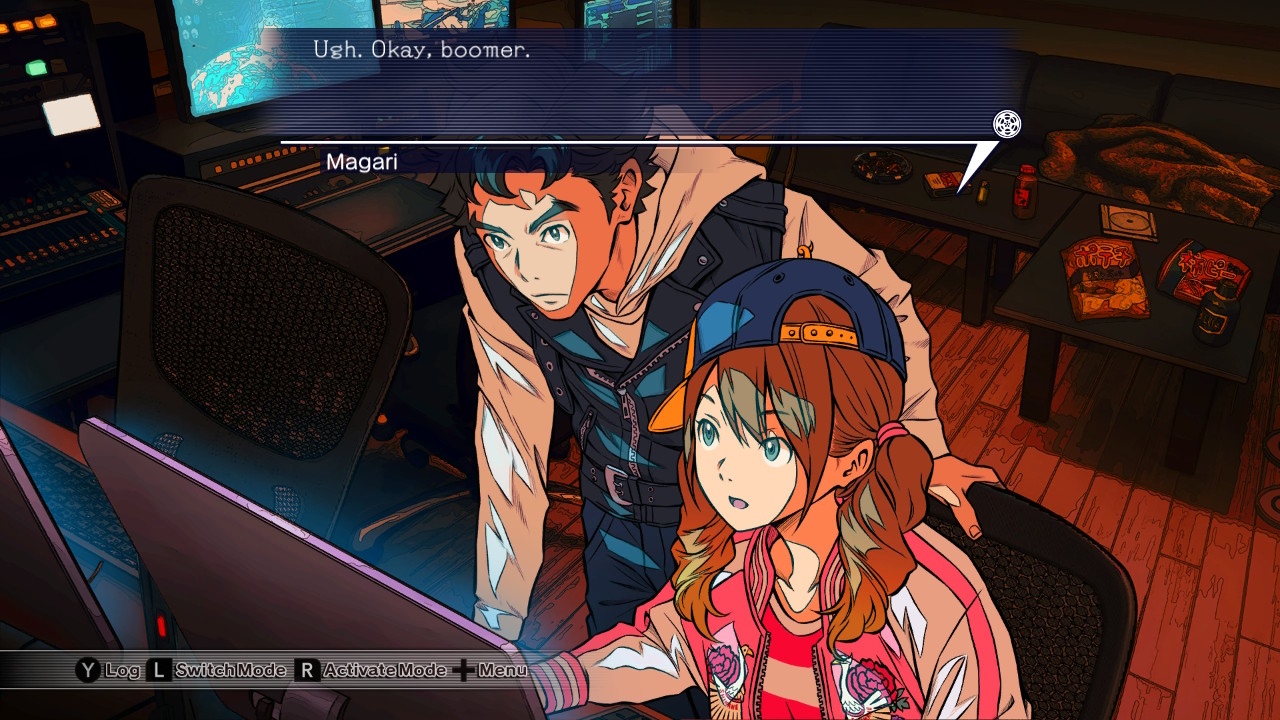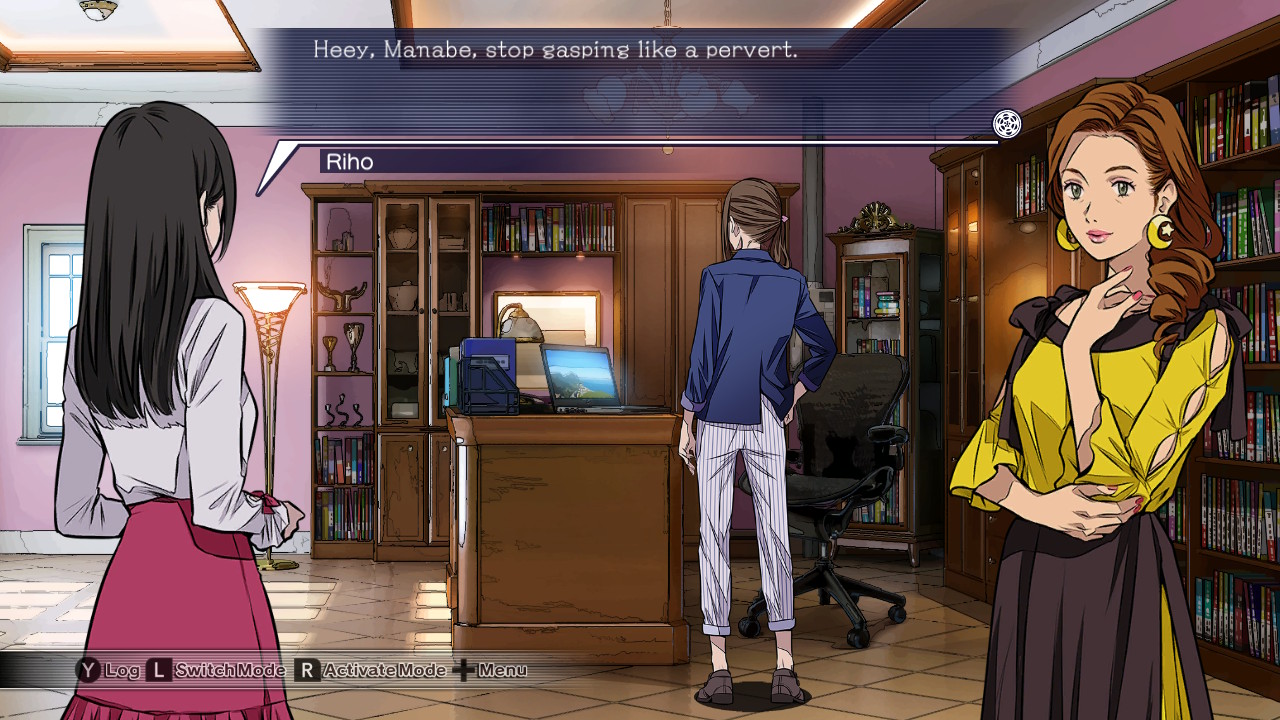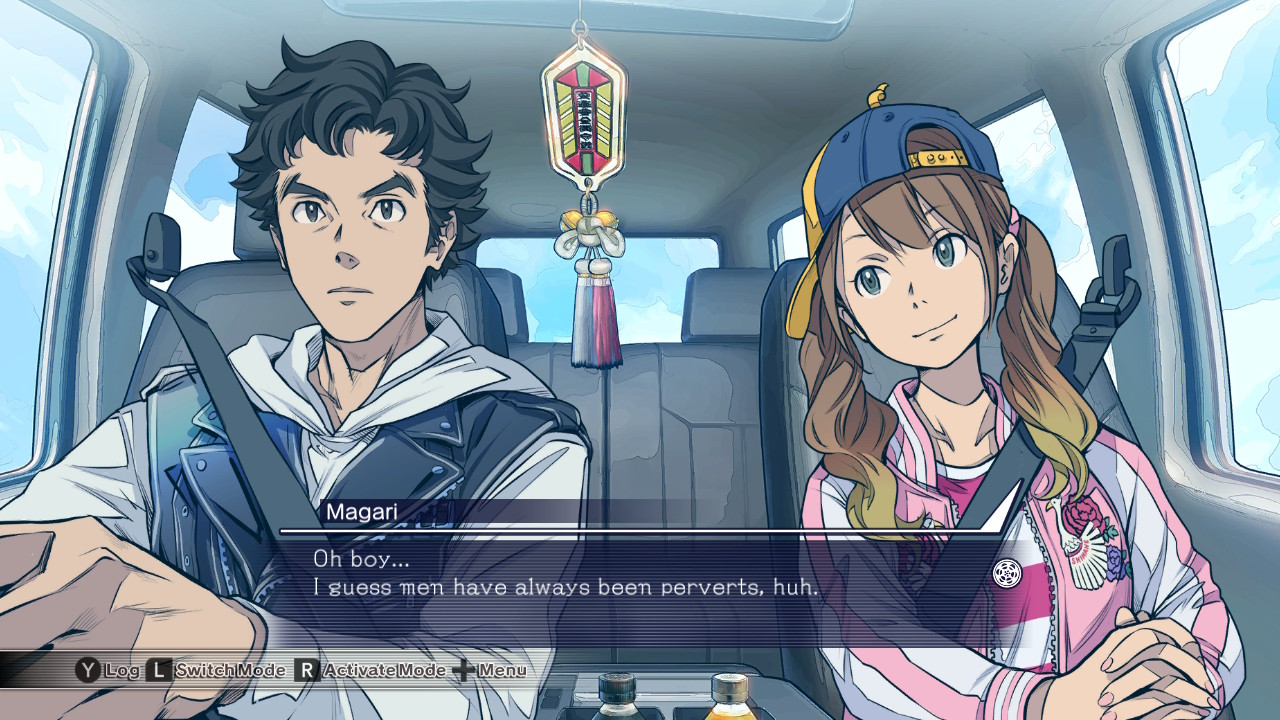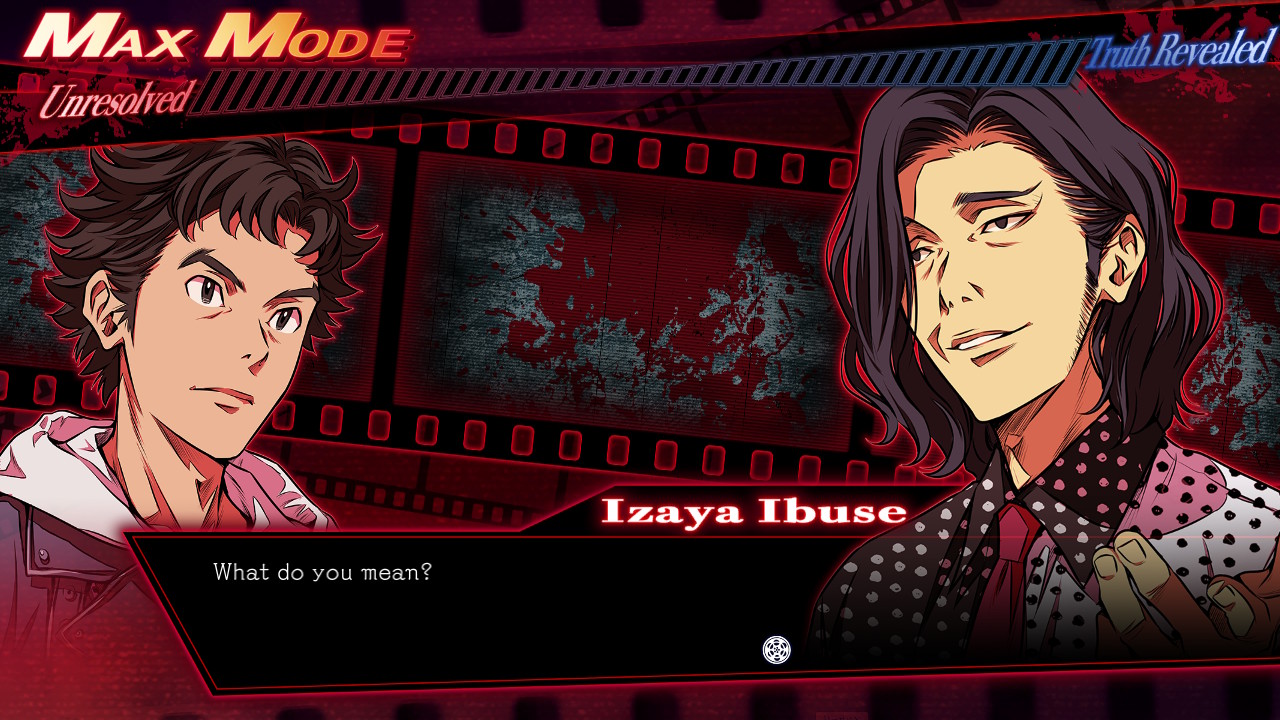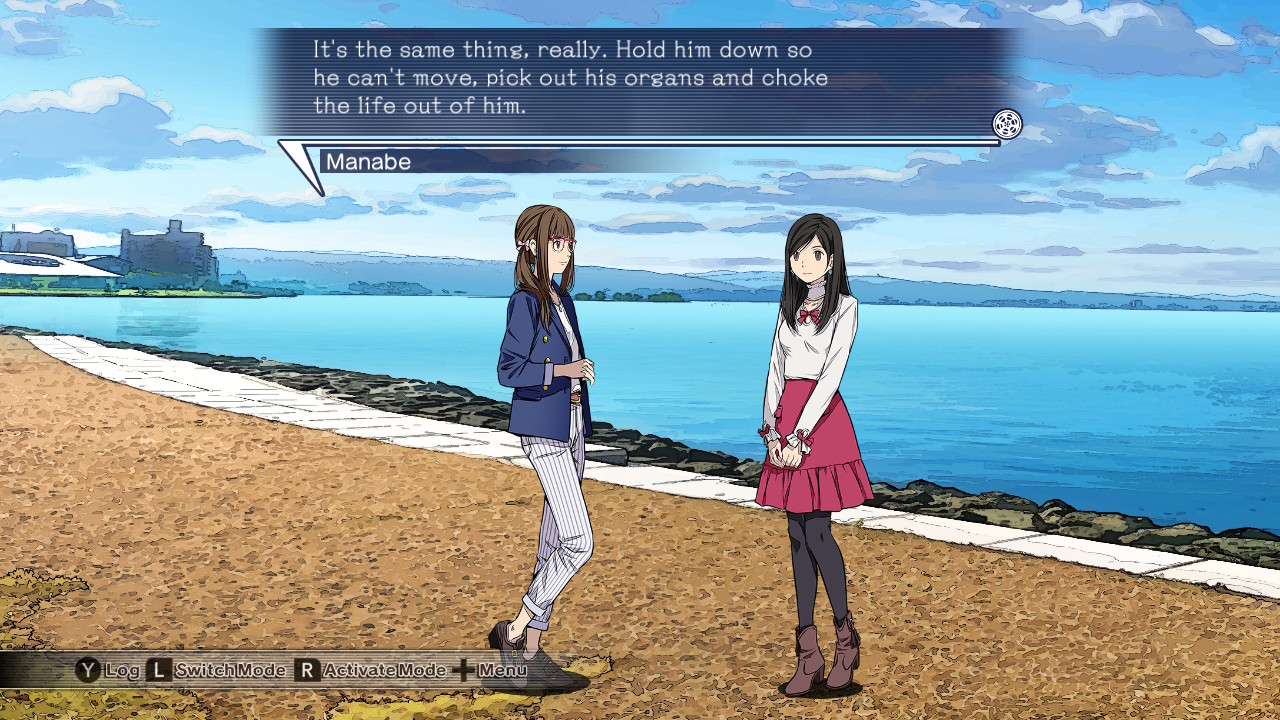Two franchises I hold in high regard are both Ace Attorney and Danganronpa. There’s just something truly special about a great murder mystery. Toss in a powerful narrative and you have your claws firmly sunken into me. Visual Novels have an innate ability to whisk me into another world. It’s a genre that will consist of minimal gameplay but expansive story. If you aren’t a fan of literary vomit, then maybe skip out on this review. It won’t matter what final score I give Root Film. With that said, read on to find out if this title is a PQube gem or turd.
A DECADE OLD MYSTERY!
Root Film has a narrative filled with twists and turns, beginning in a dark manner. A woman is perched high above on a building’s ledge about to jump to her death. Despite the cries behind her, she ignores it and steps off. She plummets to the ground, hitting with a thud but doesn’t die immediately. As she helplessly lays there, groups of people surround her bloody body. No one calls an ambulance, snapping pictures instead. Before she passes, the final thing she sees is the lights of smartphones shining upon her.
Root Film follows a young studio that’s lead by a fledgling director. During a day’s work, he’ll notice odd emails in his inbox. Their contents touch on a filming set incident that occurred a decade prior. Footage is said to no longer exist but the sender says otherwise, piquing his intrigue. The director is prepared to confirm the assertion made but before he can do so, he is accepted as part of a huge movie project. It seems that he must toss away any curiosities to scout movie locations. Unfortunately, fate has alternate plans as death follows his every move. Could one of them be a murderer, or is it just horrible luck? It might even be a much more nefarious reason.
MEET THE CAST!
- The Young Director: Yagumo is the main character and one of four that we constantly follow. He owns a studio of his own and employs a cameraman and assistant. Unlike most in the industry, he’s laid-back and not as professional as you’d expect. That becomes abundantly clear by his interactions with both of his employees. I personally liked this as it made him relatable. While there’s not substantial development, the charm he exudes is evident. This is a trait that’ll extend to the others. Apart from his kindness and young face, there will be something else that helps him stick out. We learn he has a unique ability called “Synesthesia“. It essentially allows him to effortlessly pull out key information, memorizing it.
- The Assistant: Magari is simply best girl and the editor of the bunch. I’d say she’s spunky and has a lot of sass that’ll display itself throughout. Like Yagumo, she’s laid-back and isn’t afraid to speak her mind. Her primary role will be to scan the footage of the various murders to find clues. In general, Magari is a typical teenage girl with slang that’s reminiscent of reality. Her persistent usage of “yeet” gave Root Film that modern touch. That aforementioned charm carries over to her dialogue as well.
- The Cameraman: Kanade is a man of few words. His responses will assuredly always be quick affirmations. It’s never exposition of long length, simply being a single sound. His inclusion doesn’t add much in the early goings, with his only role being that he films everything. It’s why this foursome always has footage of the murder scenes. As the story progresses, his passion for filming eventually awakens something within him.
- The Actress: Hitoba is a reserved, shy girl. It’s a bit surprising since she’s an up-and-coming actress. Yagumo chose her as his lead for a collaborative film with two other directors. She and Magari quickly become close, gossiping and admiring pretty trinkets together. This helped her endear herself to me because of their authentic interactions. I’d reckon she’s the most developed. We witness her grow comfortable with the group. Hitoba will even begin to tease Yagumo as the game progresses. I can’t divulge the reason I connected with her, but it hit hard. By the end of my session, I felt genuine empathy.
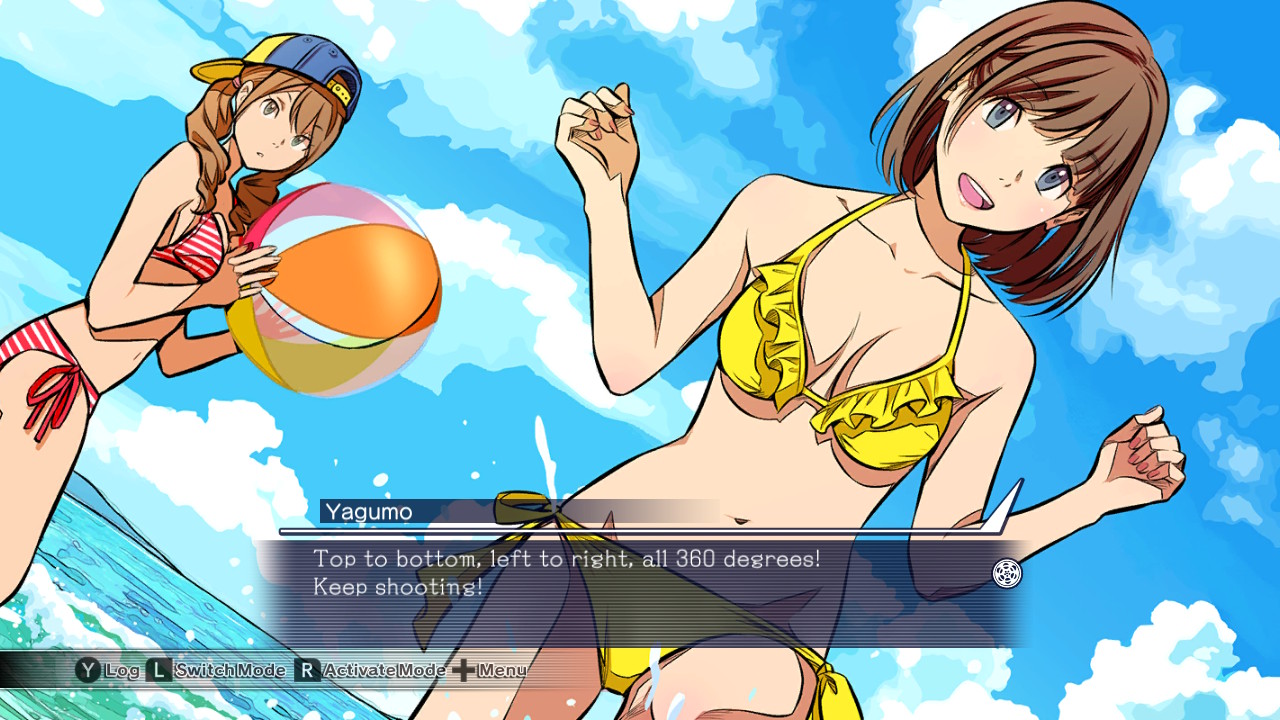 Riho’s Manager: Manabe is an astute businesswoman. She’s professional and wants nothing but to protect her client. In fact, we see that immediately. Riho has a photoshoot and as she finishes, the cameraman attempts to coerce her into coming with him. Manabe jumps into action, interjecting herself. Of course, there’s a silly side to her but only with Riho. When they’re together, she’ll let herself loose and fangirl over passions. Professionalism goes out the window, resulting in a few humorous situations.
Riho’s Manager: Manabe is an astute businesswoman. She’s professional and wants nothing but to protect her client. In fact, we see that immediately. Riho has a photoshoot and as she finishes, the cameraman attempts to coerce her into coming with him. Manabe jumps into action, interjecting herself. Of course, there’s a silly side to her but only with Riho. When they’re together, she’ll let herself loose and fangirl over passions. Professionalism goes out the window, resulting in a few humorous situations.- The Actress: Riho is a happy-go-lucky girl with an affinity for mystery novels. It’s why she aspires to be in movies of the same genre. In terms of personality, she was most like myself. Her humor‘s anchored by terrible puns. The minute she utters one, her manager groans. In this way, I grew to like her but it was nowhere at the level as the others. To be frank, she and her manager were the weakest of the six. Because of limited screen time, I couldn’t fully invest in either.
SWELL EXCHANGES!
An exquisite narrative lends itself beautifully to an excellent visual novel. If it’s redundant and dull, the game completely crumbles into pieces. I’ve had my fair share of duds and I’m happy to report that Root Film doesn’t fit that description. To say it’s without fault would be lying but I never found it too damaging to the overall package. Enough ranting on though – let’s get into specifics.
Communication between Yagumo and Magari resembles that of siblings. The banter had me legitimately chuckling out loud. Their love to tease one another was easily a highlight. One example happens while exploring. I went to a shrine located on a hill. Magari will comment on how high up they are. To which Yagumo responds by pointing to his surprise that she enjoys being high. Sensing his sarcasm, she reacts with a glare – if looks could kill. Their chemistry is obvious and convincing; a feat that’s impressive in itself. Translating it into text form is no easy task. All in all, I adored most of the writing in Root Film. Oh, and if you recall The Three Stooges, you’ll see some slapstick comedy too. As a package, I was in stitches over the interactions.
As I’ve mentioned, the story has flaws. While I mostly enjoyed it, some logic felt like a stretch. One particular case had a convoluted solution. It saturated a straightforward plot point with fluff. Furthermore, I was able to correctly call two culprits, though the surprise of how they did still interested me. Despite having lost a bit of mystery, there was a healthy amount of misdirection. I’d wager to claim it outweighed that predictably. Not to mention that there’s a bit of foreshadowing sprinkled throughout that I missed initially. Once I got to the end, I swore out loud as I realized how it connected to past events.
SEARCHING FOR CLUES!
There’s a reason I singled out two titles in the introduction. Root Film borrows a mechanic from each, only it strips it down to the bare minimum. Much like Phoenix Wright, you’ll need to investigate. It’s, however, handled a bit differently. There are designated squares indicating which area can be interacted with. This limited frustration because I was never hovering aimlessly. I knew exactly where to look or who to speak to. To some, this sort of hand-holding is a bother. I welcomed it as it meant the pace was rarely interrupted. That leads to my one minor complaint. The next destination wasn’t always clear but because the choices are negligible, it never took time to get back on track.
THAT SEEMS IMPORTANT!
Danganronpa consists of two portions; you’ll gather clues and partake in trials. Root Film borrows from the latter. Thanks to Yagumo’s Synesthesia ability, he’s able to nitpick at the morsels in testimonies. By accumulating key phrases, he can acquire enough evidence to successfully interrogate suspects. The one-on-one proper is ridiculously easy since the game won’t ask you to choose between them all. To be honest, the bulk of the phrases aren’t even needed. In other words, if I collect a total of twenty, only nine are utilized. Weirdly, I’m supposed to get all available intelligence, only to use a fraction. That comes across as padding the game out. Fortunately, it meant further dialogue too and I was for it. For those wondering, when I said the questioning was easy, it is. The only time I had any trouble was with the final individual.
VOICES OF THE STUDIO!
Now, as I’ve made abundantly clear, unlike some of the other writers here, I prefer dubs. With that said, I don’t love or hate subs. The Yakuza franchise is not known to have a dub and I love the voices of it. Root Film is also fully Japanese and it’s well done. Emotions fit the accompanied dialogue, amplifying the immersion. When it called for silliness, the inflections were on point. I really have to applaud the actors and actresses that had any part in bringing this to life. They all did a fantastic job and it added to my overall enjoyment.
VERDICT
Root Film tells a gripping and engaging tale of mystery. I was at the edge of my seat, trying to figure out how they’d explain cases. Though it is worth noting that I did feel like there are leaps of logic. Furthermore, two culprits were easily predicted, despite a lot of twists and surprises. I wouldn’t hold that against Root Film for the fact that the journey was fun. It’s full of laughs and physical comedy. The banter alone is worth the price of admission. All the characters had charm to some degree. I was immensely impressed that chemistry was so well captured. The localization team did an amazing job. There are tiny mistakes such as missing words but nothing extensive. It isn’t a shock to find as the script is huge, so mistakes like that are bound to happen.
The gameplay is limited and it does hold your hand. A lot of the mechanics implemented are designed to not be overly taxing. It’s obvious that the meat of that buffet is in the literary seasonings. And it hits a home run over the metaphorical fence. I do, however, wish that both Riho and Manabe got bigger parts. They seemed so likable but I never got the chance to invest. If anyone is wondering about how it ends, I think it does fantastically. It tied up all the loose ends nicely. The bits of foreshadowing are also well-done.
There’s a spectacular journey to be had here and for that reason, I say;
ROOT FILM IS HIGHLY RECOMMENDED
If you would like to see more Visual Novels, you may be interested in our review of Perverse Incentives.
Many thanks go to PQube for a Nintendo Switch review code for this title. Much love goes to Lion for his love, support and education on the English language.
Painfully single, but still somehow a master of dad jokes. If asked, he’ll answer it’s for his inner child. Fabio enjoys JRPG’s and has embraced his anime love.

